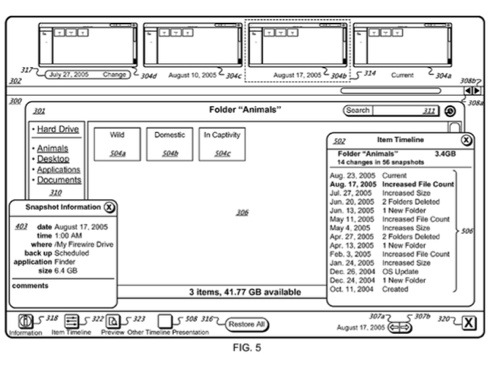An Apple patent (number 20120198383) for an user interface for backup management has appeared at the U.S Patent & Trademark Office. It seems to involve a revamped version of Mac OS X’s Time Machine feature.
The patent is for methods and a computer program product for providing a user interface including earlier versions of data. In one implementation, a method is provided. The method includes receiving, while a current view is displayed in a user interface, a first user input requesting that a backup interface be displayed. In response to the first user input, the transition from displaying the current view in the user interface to displaying the backup interface is animated.
The backup interface is displayed including a display area for presenting at least a first visual representation of an earlier version of the current view, where the earlier version includes a first element. While the backup interface is displayed, a second user input is received requesting that the current view be modified according to the earlier version. In response to the second user input, the current view is modified according to the earlier version.
Here’s Apple’s background on the invention: “Modern graphical user interfaces allow a large number of graphical objects or items to be displayed on a display screen at the same time. Operating systems, such as Apple Mac OS, provide user interfaces in which a number of windows can be displayed, overlapped, resized, moved, configured, and reformatted according to the needs of a user or a particular application. Taskbars, menus, virtual buttons and other user interface elements provide mechanisms for accessing and activating windows even when they are hidden behind other windows.
“With the sophisticated tools available, users are encouraged not only to create and save a multitude of items in their computers, but also to revise or otherwise improve on them over time. For example, a user can work with a certain file and thereafter save its current version on a storage device. The next day, however, the user could have had second thoughts about the revisions, or could have come up with new ideas, and therefore opens the file again.
“The revision process is usually straightforward if the user wants to add more material to the file or make changes to what is there. However, it is typically more difficult for a user to revert a file back to an earlier state if the user has changed his/her mind about modifications that were previously made. Application programs for word processing typically let the user ‘undo’ previous edits of a text, at least up to a predefined number of past revisions.
“The undo feature also usually is configured so that the previously made revisions must be undone in reverse chronological order; that is, the user must first undo the most recently made edit, then the second-most recent one, and so on. If the user saves and closes the document and thereafter opens it again, it may not be possible to undo automatically any previous edits.”
The inventors are Pavel Cisler, Mike Matas, Marcel van Os, Gregory N. Christie, Kevin Tiene, Gene Zyri Ragan and Scott Forstall.





